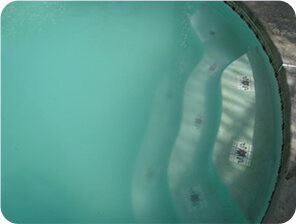Author Archive
What Is Algae?
Posted by: | CommentsAlgae is the most common fouler of pools. When pool owners panic and run screaming to a pool pro for help, algae is most frequently the cause. That’s why we call it one of the best salesmen. You must deal with an algaecide. Actually, in addition to getting rid of algae, one of the most effective uses of algaecide is to extend the effectiveness of chlorine residual. While chlorine is an algaecide, it’s wise to add additional quantities as a backup, a maintenance dose.
What is algae?
Algae are small plants Read More→
Preventing Cloudy Pool Water
Posted by: | CommentsHow to prevent and eliminate cloudy water
 As bather loads peak in the summer heat, it is that time of the year again when sparkling clear water can become clouded and unsanitary. What is a pool operator to do? Cloudy water is an indication that the disinfection and filtration systems are not keeping up with the load being placed on them by the number of bathers using the pool. Cloudy water is not just unappealing to the bather. It can also be a health hazard by inducing potential spread of illnesses and decreasing the lifeguards’ ability to see submerged drowning victims. There are many reasons water can become cloudy. Let’s break down the causes, then review the remedies of unsightly and potentially hazardous water. Read More→
As bather loads peak in the summer heat, it is that time of the year again when sparkling clear water can become clouded and unsanitary. What is a pool operator to do? Cloudy water is an indication that the disinfection and filtration systems are not keeping up with the load being placed on them by the number of bathers using the pool. Cloudy water is not just unappealing to the bather. It can also be a health hazard by inducing potential spread of illnesses and decreasing the lifeguards’ ability to see submerged drowning victims. There are many reasons water can become cloudy. Let’s break down the causes, then review the remedies of unsightly and potentially hazardous water. Read More→
The Cure For Common Pool Stains
Posted by: | CommentsA stain on the wall or floor of a swimming pool is either caused by metals in the pool water, or by something organic. The best clue to the source of the problem is the color of the pool stain. Stains on the walls or floor of a pool that are a greenish brown color are typically related to something organic, such as leaves sitting on the floor of the pool during the winter, or algae. Read More→
The Truth About Salt
Posted by: | CommentsFor the last several years, chlorine generators have been gaining momentum in North America as primary sanitizers for all pool types. Pool builders are responding to customer buzz by packaging them into their new construction projects. Field technicians are using them to generate additional service revenue. Even the “pop-up” pool makers are actively in the salt business, selling generators for even the smallest above ground pools. Based on what we hear from customers in our stores, most customers are being told that all you have to do with “salt systems” is add salt, and the pool will take care of itself. “Set it and forget it” just like TV infomercials. But all the buzz and infomercials aside, I think its time for some straight salt talk.
How it works…the truth
This may not surprise most of you reading this, but salt generators are actually creating chlorine! Some people are still surprised by this fact when they start asking about salt systems. Water travels through a “cell” in the pool’s circulation system. The cell contains layers of metallic plates that are electrically charged by the generator’s power Read More→
Pros and Cons of Converting to a Saltwater Pool
Posted by: | CommentsPool owners have many positive and negative aspects they should consider before they convert their pools to salt systems. While swimming in salt water is considered more enjoyable than swimming in traditionally chlorinated pools, the costs of initial installation and keeping up repairs can be off-putting to some homeowners. Here are some of the pros and cons of converting to a saline pool system.
Maintenance
Maintaining your saline pool is easier than maintaining a chlorinated pool. Because your salt system converts the salt to the needed chlorine, you are not having to constantly add more chlorine to your pool. This makes maintenance much easier. You still have to check your pool’s water for the appropriate chemical levels, but you do not have to be constantly pouring in buckets of chemicals to keep your pool safe.
Softer Water
Although saltwater pools do still contain chlorine, their water is much Read More→
Salt Water Pool Treatment Facts
Posted by: | CommentsWhile they were once only used sporadically, today, salt water pools are becoming more and more popular for homeowners. However, although many salt water pool manufacturers promote the ease of converting your pool to a salt water system, the pool treatment methods are not any easier than those of a typical pool. Before your convert your system, it is important to understand how it works and why you should (and should not) consider converting.
Salt treatment begins with understanding exactly how salt water pools’ chlorination systems work. The basis behind this system is that you do not have to add chlorination for this treatment. However, that does not mean that there is no chlorine. Read More→











